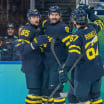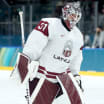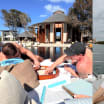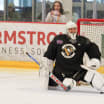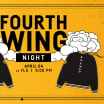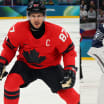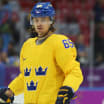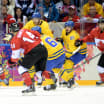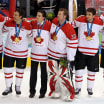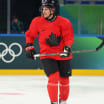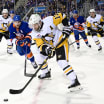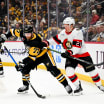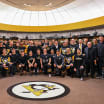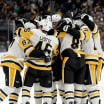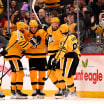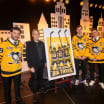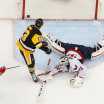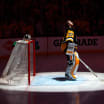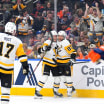The origin of the Pens-Caps rivalry
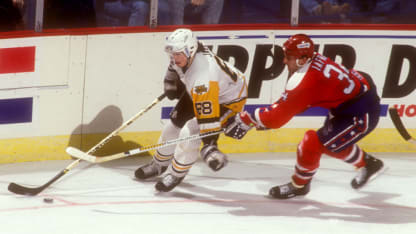
© Mitchell Layton/Getty Images
The rivalry began building during the 80s. The two teams had some heated battles and encounters.
"There were some knockdown, drag-out fights and battles," recalled Hall of Fame broadcaster Mike Lange. "There had been an ongoing rivalry between those two teams since the early 80s."
That animosity boiled over in the 90s when the teams faced off in the Stanley Cup playoffs in 1991 and '92.
The Pens won the '91 series, 4-1, en route to the franchise's first-ever championship. But it was the following year that took the Pens-Caps rivalry to the next level.
The Capitals finished with the second-best record in the entire NHL in 1992 and would host the Pens in the Patrick Division semifinals to open postseason play. The Caps had legit threats in Peter Bondra, Michal Pivonka and Joe Juneau. Washington was quick to assert its physical dominance.
"That was probably the toughest battle the Penguins have ever had. It was a different brand of hockey," Lange said. "They had big strong guys like Al Iafrate, (Kevin) Hatcher, (Dale) Hunter. (Calle) Johansson. Our guys paid the price. They got battered, bruised. That was one of the most physical series they had."
The Capitals took a commanding lead in the series following their 7-2 Game 4 victory in Pittsburgh.
"We got run out of the building," Lange said. "Everyone was booing the Penguins. Saying they wouldn't win another game."
"We got booed off the ice. That never happened to our team," said Penguins radio analyst Phil Bourque, a member of the team's '91 and '92 championship teams. "Sometimes you need to be completely humbled like that to have that turnaround. And really get shaken emotionally. We were."
Things looked dire. However, a tactical adjustment saved the Pens' fate. Pittsburgh employed a 1-4 delay to cut off the Capitals' offensive game and used their transition attack to fuel a series comeback.
"That was our leadership group that went to (head coach) Scotty (Bowman)," Bourque said. "There were rumblings on the team bus about changing things up. 'It's not working right now. What could we do better?'
"It was really Mario (Lemieux), Ron (Francis) and (Bryan) Trottier that went to Scotty and they came up with this idea. We all bought in."
The Pens' new defensive-minded strategy paid off. Pittsburgh won three straight contests to take the series. The Pens would go on to win the Cup in back-to-back seasons.
"We frustrated the hell out of them," Bourque said. "They didn't change. They were stubborn. They were trying to carry the puck through the neutral zone and beat us at the blue line. They fed our offense.
"You give us a sliver and we'll kick the door wide open. We had the horses. We just needed to get the momentum back on our side."
Pittsburgh won the decisive Game 7 by a 3-1 score in Washington. It's a game that Bourque will never forget.
"That Game 7 win at the old Caps Center was as good as any Stanley Cup win or anything in my whole career," he said. "I remember jumping up and down on the bench like I was an 8-year-old kid. To come back like that, against that team, that was the genesis of this dominance."
The dominance is that Bourque mentioned is in regard to the Pens having won eight of nine lifetime playoff series against Washington. It was the also the genesis of a stigma that has haunted Washington's franchise since that series.
"That's when the Caps as chokers originated. That's where it all started, in that series," Lange said. "That's carried over. They can't get away from it because people that were around 25 years ago won't let them forget."
Though the unwanted mark may have begun in that series, it was intensified following Pittsburgh's 4-2 conference quarterfinals victory in 1996. In that series the Caps won the first two games of the series on the road. But Pittsburgh stormed back to win four straight and take the series.
The series changed in Game 4 in Washington. Lemieux had been ejected from the game and backup goaltender Ken Wregget was forced into action. The contest went into four overtimes. That's right. Four.
The Pens won the contest off the stick of winger Petr Nedved. And everyone knew at that moment that Pittsburgh was going to win the series.
"That was the dagger of daggers," Lange said. "It sucked the wind out of them. You could feel it in the building. You could feel it in the guys after. The whole city was saying 'Here we go again.' The seed was planted in '92 but that solidified that reputation."




